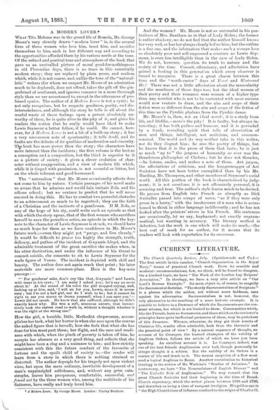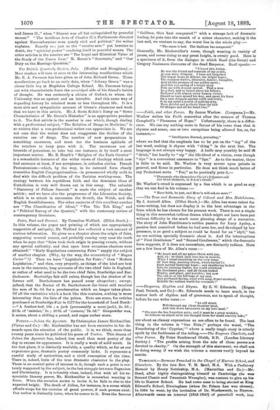CURRENT LITERATURE.
The Church Quarterly Review, July. (Spottiswoodo and Co.)— The first article in this number, "Church Organisation in the Royal Navy," treats of practical Church work. From its sensible and moderate recommendations, few, we think, will be found to disagree. On a kindred topic, we have " The Work of the London Lay Helpers' Association." In theology, we have a very able article on "Our Lord's Human Example." Its main object is, of course, to magnify the Sacramental doctrine. "The sturdy Sacramental ism of Scripture" is a phrase which tho author, not without some boldness, uses against his adversaries. Sacramentaliam is not, however, the only alternative to the teaching of a mere historic example. It is possible to believe in a Presence of which the Sacraments are the con- stant witness, but which is not limited to them. Communities which, like the Friends, have no Sacraments, and those which on the reviewer's principles have quite ineffectual pretences of them, may be partakers of this Presence. Whence, otherwise, do they got their results of Christian life, results often admirable, both from tho theoretic and the practical point of view ? By a natural sequence of thought, an account of Le Conrayer, the learned champion of the validity of Anglican Orders, follows the article of which we have just been speaking. An excellent account it is. Le Courayer, indeed, was one of the best friends Anglicanism ever had, though personally he always thought it a schism. But the validity of its Orders is a matter of life and death to it. The merest suspicion of a flaw must send a logical Anglican to Rome. Another contribution to historical theology is the review of Mr. Watkins's "Studios of Ariinism." In controversy, we have " The Nomenclature of English Dissent " and "The Catholic Side of Anglicanism." We may remark that the great Church Societies had their beginning in the time of Broad. Church supremacy, which the writer places between 1685 and 1760, and describes as being a time of rampant irreligion. His golden ago is " the High-Church time of influence confined to the reigns of Charles IL
and James II.," when "Dissent was all but extinguished by peaceful means." " The invidious Acts of Charles H.'s Parliaments directed against Nonconformists were purely civil and political," the writer explains. Exactly so ; just as the "secular arm" pat heretics to death, the "spiritual power" confining itself to peaceful means. The other articles in the number are " The Legal and Historical Value of the Study of the Canon Law," M. Renan's " Souvenirs," and " Our Duty on the Marriage Question."



































 Previous page
Previous page